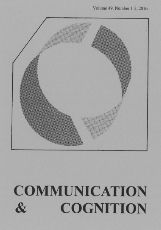C&C 50, 3-4 (2017)
|
A NOTE ON THE ARTEFACTUALIST THEORY OF FICTIONAL OBJECTS Zoltán Vecsey Abstract |
|
Proponents of artefactualist theory of fiction hold, unanimously, that literary characters and events are abstract artefacts. There is a disagreement, however, concerning the existence conditions of these objects. It is no easy to understand how abstract artefacts depend for their existence on concrete processes and objects. This paper gives an overview of the explanatory strategies currently employed by artefactualists. The overview ends with some critical comments on the linguistic background assumptions of the artefactual theory.
|
| REPRESENTATIONAL FLEXIBILITY IN FRACTIONS AND DECIMALS: A SYNTHESIS OF RESEARCH STUDIES Athanasios Gagatsis, Eleni Deliyianni, Elia Iliada, Areti Panaoura Abstract The aim of this paper is to present and critically discuss the results of the published work of a large-scale project which focus on representational flexibility in fractions and decimals. The published results address the issue of transition between levels of education which is an integral part in educational research. The fact that the project concentrated both on cognitive and affective domain developmentally in respect to the use of representations is also worth mentioning. Furthermore, a synthesis of these studies’ theoretical contribution and didactical implications is undertaken considering other researchers’ work. |
Context, Assertibility, and the Epistemology Sanford C. Goldberg Abstract Though by no means a consensus, a popular view in the literature on assertion is that the standards for warranted assertion can vary with context. I will call such a view, ‘Variability in Assertion’s Standard,’ or ‘VAS’ for short. Most familiarly, VAS has been used, together with the Knowledge Norm of Assertion, as part of an argument for a contextualist semantics for ‘knows’ (see e.g. DeRose 2002; Shaffer 2008 defends a contrastivist account on these grounds). Others have used VAS, together with a commitment to an invariantist semantics for ‘knows’, to reject the Knowledge Norm of Assertion itself, in favor of a contextualist account of the norm of assertion (Levin, 2008; Rescorla 2009; Brown 2010; Maitra and Weatherson 2010; Gerken, 2013, 2014; McKinnon, 2013, 2015; Goldberg, 2015). One might also try to explain away the phenomena that appear to support VAS, by arguing that what appear to be warranted assertions answering to different standards are actually no such thing. Perhaps this is because the appearance of (un)warrantedness itself is illusory. Alternatively, perhaps this is because the appearance of (un)warranted acts of assertion is illusory (Turri, 2010). While the discussion surrounding VAS has taken place mainly in the literature on assertion, we can shed some light on the commitments of these various views by linking that discussion to the literature in the epistemology of testimony. On the (plausible if not universally-endorsed) assumption that the act of testifying requires a speech act that is governed by the norm of assertion, I ask what the various views described above imply for the epistemology of testimony – in particular, for the conditions on, and prevalence of, justified testimonial belief and testimonial knowledge.
|
|
Conceptualization of a 3-level evaluation framework for HEI computing education Peter Kaczmarski, Peter De Puysseleyr, Fernand Vandamme Abstract In this paper we present a 3-level evaluation framework for HEI (Higher Educational Institutions) education in computing and information technologies. Our aim is to stimulate the creation of an enhanced education process for this domain which incorporates acquisition by students of “competent behaviors” already during their education. This is in contrast to the classic model of education where competences are assumed to be acquired in post-educational phases of the professional development. As a key element of the evaluation we propose an “educational profile” being a blend of domain knowledge, skills and competences. A 3-level evaluation framework is outlined focusing on evaluation of the education programs, evaluation of the modalities offered by the educational institutionsa, and finally the evaluation the students’ competences acquired within the educational process. The approach which we propose can be referred to as a “Programs-Modalities-Competences” (PMC) evaluation approach.
|



